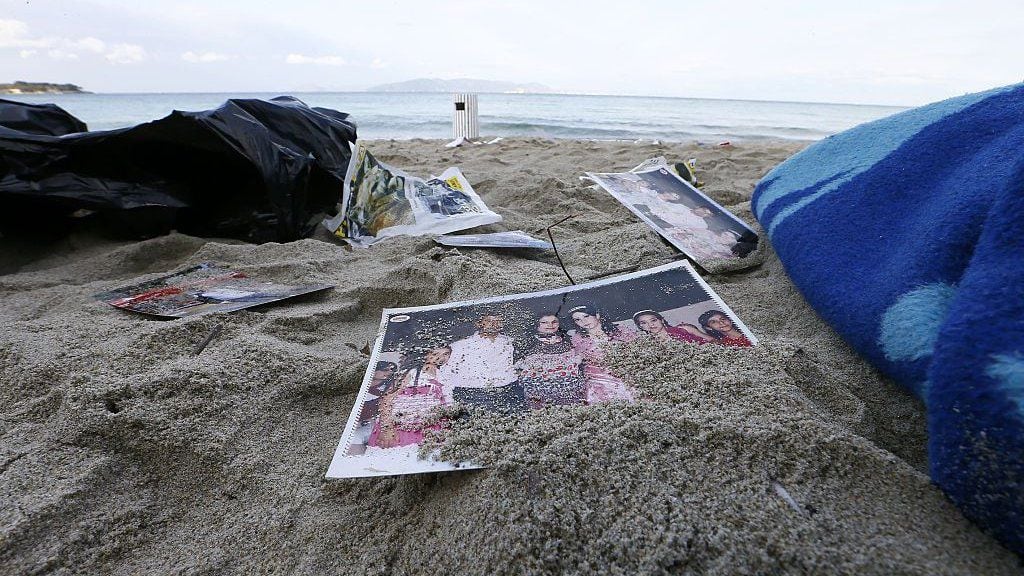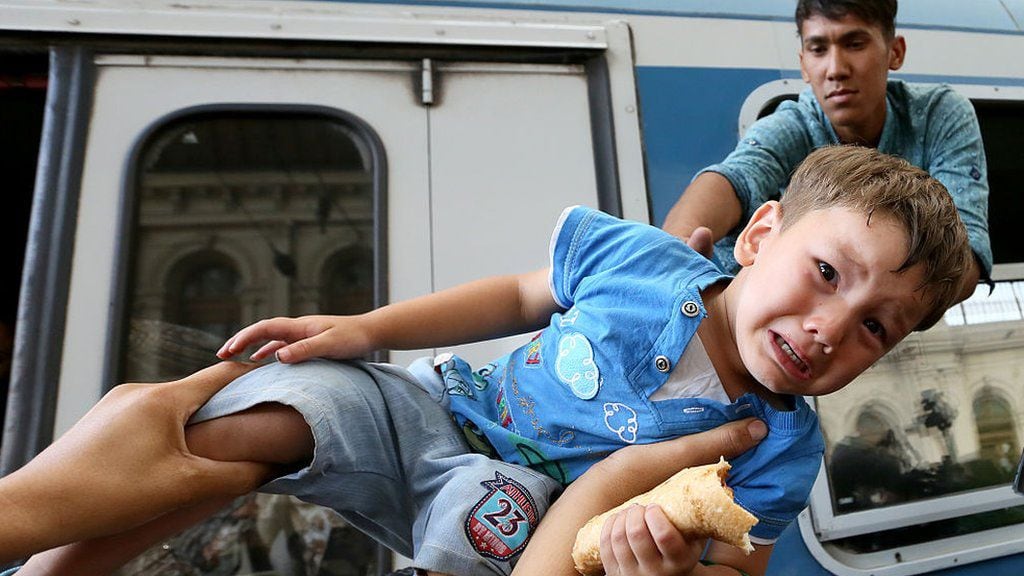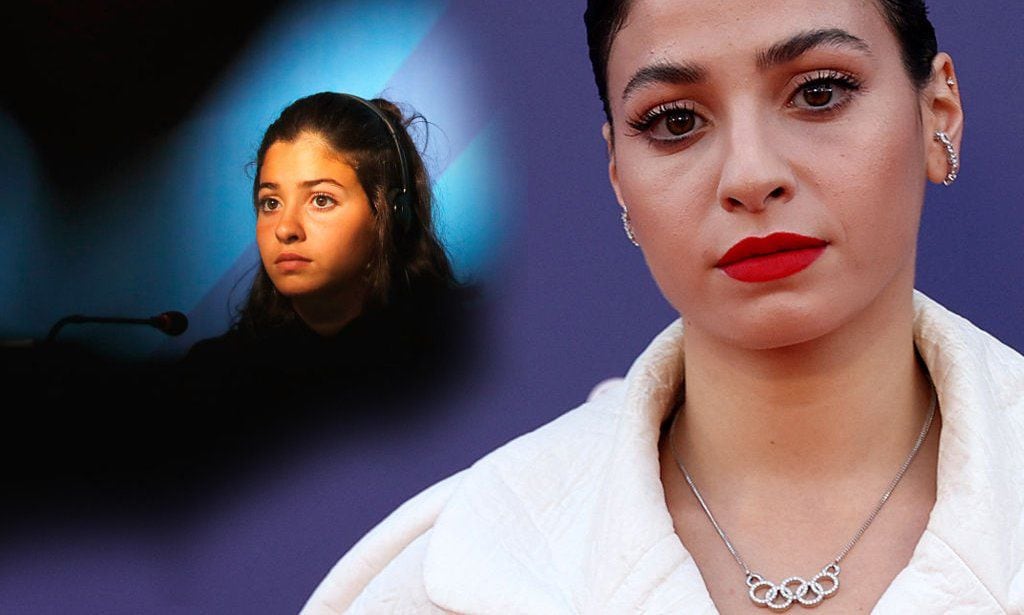:quality(75)/cloudfront-us-east-1.images.arcpublishing.com/elcomercio/GIYTCMZNGAYS2MRRKQYDAORSGE.jpg)
It is water that has marked the lives of sisters Yusra and Sara Mardini.
In it they learned to push for excellence from the hand of their father and their skill led them to be part of the national youth swimming team of their native Syria.
In it they felt the terror of war when a bomb fell in the pool where they were training, and prompted them to leave the country.
LOOK: “From the moment I arrived in Switzerland as a child, I lived in hiding”
In it they knew the anguish when, crossing the Aegean Sea, the boat provided by the human traffickers began to capsize, endangering their lives and those of 16 other people.
In it, Yusra triumphed in the Rio de Janeiro Olympics and became the voice of refugees, and together with her, Sara helped other migrants, for which she now faces Greek justice and up to 20 years in prison.
Her story inspired the Netflix film “The Swimmers”, directed by the Egyptian Sally El Hosaini, in which the Lebanese sisters Nathalie and Manal Issa recreate the experiences of the Syrian sisters.
explosive reality
It was in 2015 that a projectile shook their lives.
“We had been practicing in the morning and when we finished, we were outside waiting for mom and boom!“Sara told the journalist Magdalena Sodomkova, who met them months later and made a documentary for the BBC.
“A bomb went off inside, there was glass everywhere.
“We were terrified. We lost several friends and even a swimming coach died.”
The Arab Spring, a series of anti-government armed protests, uprisings and rebellions that swept across much of the Arab world in the early 2010s, had reached Syria a few years earlier.
The beautiful name of the insurrection translated into violent confrontations that turned the journey to the pool in which they were swimming into a dangerous journey.
Half the population of Syria fled.
Yusra and Sarah wanted to do the same, but their parents refused to even discuss the possibility.
Until that day.
When the girls found out that a 15-year-old friend had made it safely to Europe, they packed their bags.
Crowds
The dream of Yusra and Sara, then 17 and 20 years old respectively, was to reach Germany.
But they were far from the only ones.
The influx of refugees and migrants into Europe reached such staggering levels that year that it was labeled a crisis and sparked stormy political debates.
To give an idea of the scale, by early December 2015 more than 911,000 refugees and migrants had reached European shores, more than 75% of them fleeing conflict and persecution in Afghanistan, Iraq or, like the Mardini sisters, from Syria.
Among those figures, the most painful: at least 3,550 lives were lost during the voyageaccording to UNHCR, the United Nations agency that deals with migration and refugees.
The main route had changed from being the dangerous Mediterranean crossing from Libya to Italy, to what would turn out to be an even deadlier crossover from Turkey to Greek islands like Lesbos.
And that last one was the one that Yusra and Sara took.
many in little
Their first attempt to cross the Aegean Sea from the Turkish city of Izmir to reach Greece was thwarted by police, who pulled them out of the water.

Hidden in the forest with other refugees, they waited another four days for those who had their fate in their hands to return.
“The traffickers are like kings. They show up and say: ‘The time has come,'” Yusra explained.
The crossing did not seem so difficult: with the indicated boat, they only had to navigate an hour and a half without being detected.
But the dealers came barking orders, they put 17 men, 3 women and a child in an inflatable boat suitable for 7 people with a dubious engineand, deaf to reason, they threw them into the water.
“15 minutes later, the engine stopped,” Yusra said. And, on top of that, the boat began to flood.
“A friend of my dad’s, while trying to get the water out of the boat, told us to be strong, to support each other, not to let panic spread.
“Everyone began to pray, fearing for their lives: many did not know how to swim.”
Distraught, they threw whatever belongings they could overboard.
But the boat kept sinking.
someone should jump into the sea.
Suddenly, “my sister jumped.”
Yusra was terrified, and so was Sara, “but I tried to push the boat,” she said.
Despite her older sister forbidding it, Yusra also jumped into the water.
“Sara was on the other side of the boat, yelling at me to get back on, but I told her no. ‘I want to stay here. I want to help.'”
“Die slowly”
The situation in the Aegean Sea was desperate.
“Two hours later we were still in the same position, with our bodies and minds destroyed.Yusra recounted.
The ship was still filling with water.
The motor would occasionally start running but stop again, abruptly jolting the girls; his arms are covered in bruises.
“We all thought: ‘why did I take this trip, why did I leave my country, my parents, my whole family? Is it really worth it?’
Several men also jumped into the water, including one who “didn’t even know how to swim. He was holding on to the rope.”
The sun was setting and it was cold.
On the horizon, Yusra could see the island of Lesbos, but it seemed unattainable.
“We were moving, but we weren’t quite there. It was really like slowly dying.”

“A friend of ours called the Greek and Turkish police for help, told them we were drowning, and the Greek only he responded by saying ‘Get back!’ in Arabic“.
It took another four hours for them to finally reach the Greek coast.
“I felt like I owned the whole world. I cried, thankful that my soul was still in my body,” Yusra recalled.
miraculously they were safebut they still had a long way to go and overcome several obstacles.
The crisis
From Lesbos, the girls took a ferry to Athens, then a bus to Macedonia and a train through Serbia, finally walking to the Hungarian border.
A barbed wire separated them from the European Union: if they crossed it and the police caught them, they could apply for asylum.
But they wanted to order it in Germany, so they needed to get through without being seen by the authorities.
They went into a cornfield because they were told that the human traffickers were there. And they waited, late into the night, hidden and freezing, until one arrived offering transport to Budapest in exchange for several hundred euros.
Upon arrival, they had to escape from the place where they were taken because they found out that “they sold the organs of the refugees or that, if they were attractive, they forced them into prostitution.”
Like so many others, they went to the international train station, which at that time was a grim scene: Some 5,000 refugees spent their days and nights there, hoping to board a train.
The police tried to prevent it and there were riots.

In the midst of the confusion, Sara and Yusra managed to get into a carriage but a woman reported them.
They had been caught.
They were confined in a refugee camp, which “was horrible”… all seemed lost.
But, once again, they managed to flee and, suddenly, fortune smiled on them: German Chancellor Angela Merkel decided to take in Syrian refugees, sending special buses to Budapest to take them to Austria and then to Germany.
Humans
“When we arrived in Vienna, it was raining and through the window we saw local people giving the refugees hot tea and coffee,” Yusra recalled in the BBC documentary.
“They’re waiting for us. And they were welcoming us! They gave us flowers, teddy bears, shampoo… everything you can imagine.

“A woman named Ann kindly let us into her apartment to take a shower. And I washed and washed and washed and saw the water coming out black.
“We all bathe, buy clothes and we feel like new people.
“Ann cooked us a hot meal and after all this horrible time it was amazing to feel like human beings again, with someone saying to you, ‘you’re welcome, we’re sorry about your war or we’re sorry about what’s happening to you.'”
One more dream
Despite the enormous difficulties of the journey, Yusra did not lose her hope: she wanted to continue being a competitive swimmer.
Through an interpreter in the refugee camp, the sisters met coach Sven Spannekrebs who, after watching them swim, recruited them and expedited the procedures to help them access accommodation and facilities at a local swimming club.
Not only that.
He also helped Yusra to fulfill his most cherished dream: swimming in the Olympic Games.
In 2016 she competed in Rio de Janeiro, as part of the first Refugee Olympic Team of the Games, winning one of her heats in the butterfly.
In 2017, she was named the youngest UNHCR Goodwill Ambassador ever, at 19 years old.

Sara, for her part, won a scholarship to study at Bard College in Berlin and began working as a volunteer at the Emergency Response Center International, a Lesbos-based NGO, to help other refugees who risked making the same dangerous crossing as she did with her sister.
In 2018, she was arrested by the Greek authorities who accused her and two other members of the group of committing various crimes, including trafficking, espionage and fraud.
She was in custody for more than 100 days before she was released on bail and returned to Berlin, where the rest of her family now lives.
When the trial against him began, he was not allowed to go to Greece to defend himself.
Human Rights Watch considers the accusation “absurd” and possibly “politically motivated”; Amnesty International described it as “unfair” and “without merit”; a study by the European Parliament described the Lesbos trial as “the biggest case of criminalization of solidarity in Europe”.
Meanwhile, the Mardini sisters have remained recognizable faces of the 5.7 million Syrians who have become refugees since 2011, a fraction of the figure reached in mid-2022 for global forced displacement according to UNHCR: 103 million people.
Many of them are, as Yusra was when she did it, under 18 years of age.
Source: Elcomercio
I am Jack Morton and I work in 24 News Recorder. I mostly cover world news and I have also authored 24 news recorder. I find this work highly interesting and it allows me to keep up with current events happening around the world.






